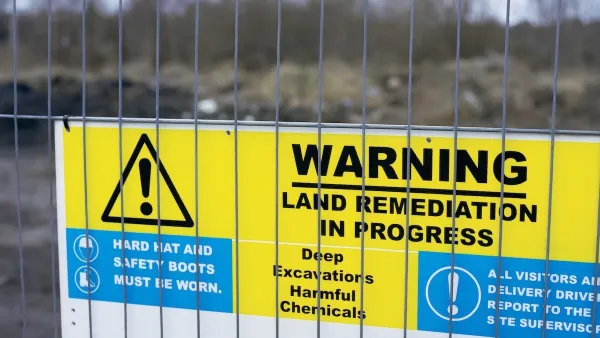The Biden administration's climate plan calls for sweeping reform in the country's energy policy and places new focus on addressing racial and economic disparities.

President Biden's plan to address climate change will prioritize environmental justice, acknowledging the country's legacy of "persistent racial and economic disparities." Writing for the Washington Post, Juliet Eilperin, Brady Dennis, and Darryl Fears call Biden's plan an "unprecedented push to cut the nation’s greenhouse gas emissions and create new jobs as the United States shifts toward cleaner energy," reporting that the president has directed federal agencies to invest 40% of sustainability funding in communities that "have traditionally borne the brunt of pollution."
Centering environmental justice could start to reverse decades of government decisions that imperiled low-income communities and people of color, "Black, Latino and Native American communities targeted for hazards that others did not want: power plants, landfills, trash incinerators, shipping ports, uranium mines and factories."
"It’s hard," the president said, referring to communities that are just a fenceline away from polluting facilities. "The hard-hit areas like Cancer Alley in Louisiana, or the Route 9 Corridor in the state of Delaware. That’s why we’re going to work to make sure that they receive 40 percent of the benefits of key federal investments in clean energy, clean water and wastewater infrastructure."
An executive order signed by President Bien established the White House Interagency Council on Environmental Justice, a new office of health and climate equity at the Health and Human Services Department, and an environmental justice office within the Justice Department.
FULL STORY: Biden to place environmental justice at center of sweeping climate plan

Planetizen Federal Action Tracker
A weekly monitor of how Trump’s orders and actions are impacting planners and planning in America.

Restaurant Patios Were a Pandemic Win — Why Were They so Hard to Keep?
Social distancing requirements and changes in travel patterns prompted cities to pilot new uses for street and sidewalk space. Then it got complicated.

Map: Where Senate Republicans Want to Sell Your Public Lands
For public land advocates, the Senate Republicans’ proposal to sell millions of acres of public land in the West is “the biggest fight of their careers.”

Maui's Vacation Rental Debate Turns Ugly
Verbal attacks, misinformation campaigns and fistfights plague a high-stakes debate to convert thousands of vacation rentals into long-term housing.

San Francisco Suspends Traffic Calming Amidst Record Deaths
Citing “a challenging fiscal landscape,” the city will cease the program on the heels of 42 traffic deaths, including 24 pedestrians.

California Homeless Arrests, Citations Spike After Ruling
An investigation reveals that anti-homeless actions increased up to 500% after Grants Pass v. Johnson — even in cities claiming no policy change.
Urban Design for Planners 1: Software Tools
This six-course series explores essential urban design concepts using open source software and equips planners with the tools they need to participate fully in the urban design process.
Planning for Universal Design
Learn the tools for implementing Universal Design in planning regulations.
Heyer Gruel & Associates PA
JM Goldson LLC
Custer County Colorado
City of Camden Redevelopment Agency
City of Astoria
Transportation Research & Education Center (TREC) at Portland State University
Camden Redevelopment Agency
City of Claremont
Municipality of Princeton (NJ)





























